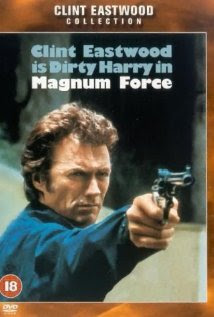
"I hate the goddam system! But until someone comes along with changes that make sense, I'll stick with the system."
(Clint Eastwood as Harry Callahan)
Clint Eastwood reprises his role as Inspector "Dirty" Harry Callahan in this sequel to "Dirty Harry." In "Magnum Force," Callahan is reassigned from homicide to stakeout duty (surveillance, essentially a first or second-year officer's job). His new partner, "Early" Smith, and Callahan begin to surreptitiously investigate homicides around the city of recently acquitted criminals, let off by a technicality. Callahan and Smith begin to suspect that corrupt cops are at the center of the crimes, including their own boss, Lt. Briggs.
"Magnum Force" emphasizes police corruption, an issue of great concern in the 1970s and 1980s (this was also the main event in "Serpico"). Police corruption was rampant in police departments in most major cities because police officers have extremely dangerous jobs but are generally paid very little. The most common form of police corruption is bribery or skimming off the top of monetary evidence such as cash or drugs (so, money-oriented). "Magnum Force" focuses on the lesser-known type of police corruption that is vigilantism. This was an issue in the 1970s and 1980s as police departments were under much greater scrutiny after a series of U.S. Supreme Court decisions that applied the 4th, 5th and 6th Amendments to the states (and not just the federal government as had been previously interpreted). As judges began holding local police departments to higher standards of search and seizure and other legal issues, more and more criminals were acquitted or had charges dismissed on technicalities. This angered police departments, and some officers took the law into their own hands.
Several noteworthy advances have been made in the decades since "Magnum Force," including the New York City Commission to Combat Police Corruption, created in 1995. As such, while police corruption still exists, it is much less common and much more well contained. Police departments also have hefty consequences for ethical violations of corruption, especially with more transparent internal affairs and ethics review boards.
0 comments:
Post a Comment